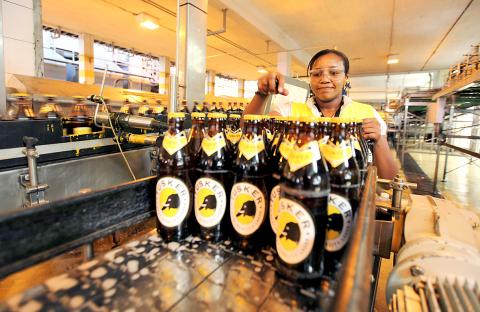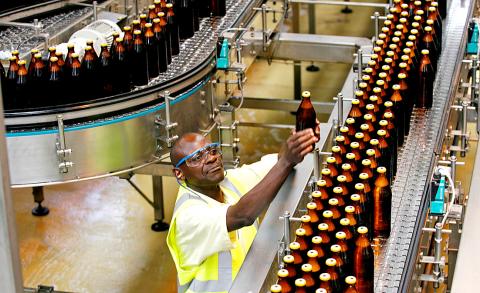International brewers in Africa are expanding their production of beers based on local ingredients, snapping up craft brewers and introducing more brands as low-cost beers gain popularity on the fast-growing but still poor continent.
Diageo acquired a South African rival specializing in local beer last year, while SABMiller is opening new production lines in markets such as Zimbabwe where cheap competitors and illicit brews often out-sell more globally recognized competitors.
Diageo unit Uganda Breweries Limited (UBL) has pinned hopes on Ngule, or “Crown” in the Luganda language, that started production this year based on cassava, a tuber that is a staple food in the nation at the heart of Africa’s Great Lakes region.

Photo: Reuters
Ngule has captured 7 percent of the formal beer market in just five months after launch, UBL says, winning customers in dusty drinking holes in poor districts of Kampala like Hope Naturinda’s bar, where it sells for US$0.65 per 500ml, less than half the price of Diageo’s renowned Guinness brand.
“More than half of my customers take Ngule now,” said Naturinda. “It’s affordable and very strong.”
It also highlights a challenge multinationals have faced across Africa. While the continent still boasts some of the world’s fastest growing economies, even with a commodities price slide, global consumer brands are still waiting for a new middle class to emerge wanting to pay for their best-known products.

Photo: Reuters
Some have responded by scaling back plans for the continent, with foods giant Nestle saying last year it was cutting 15 percent of its workforce in Africa because it had overestimated the rise of the middle class.
But in the beer business, brewers from Nigeria to Kenya and Uganda to Mozambique are turning instead to maltose extract from cassava or malted sorghum grain to replace pricier barley, helping reduce input costs and creating new popular products.
LOCAL TASTES
“Traditional African beers present a significant opportunity within these markets,” said SABMiller spokesman George Hudson.
“To play seriously within the affordable segment in Africa, which is one of the largest in the world, it is important to produce beverages that are attuned to local tastes, at prices that are fair and reasonable,” he said.
Global brands often find their offerings competing with far cheaper, unlicensed alcoholic drinks, including some lethal distilled concoctions.
“A substantial amount of alcohol consumed in most of these markets is informal and untaxed because mainstream alcohol is relatively unaffordable,” said SABMiller’s Hudson.
Consequently SABMiller is fighting back with drinks tailored to specific markets. In Zimbabwe it is commissioning a new production line for its sorghum-based Chibuku beer, the third expansion in three years, and in Mozambique its cassava-based Impala brew is winning clients in the capital and beyond.
“I drink Impala because it’s the cheapest beer around here,” said Clemente Macie, a plumber, sipping from a bottle at Pequeno Brasil (Little Brazil) bar, in Khongolote near Maputo.
Local sorghum has been a barley substitute for Nigerian Breweries, a unit of Heineken, since the 1980s. Since last year, it has worked with a local firm and US-based non-profit organization International Fertilizer Development Centre to improve cassava production.
“The brands that contain maltose extract from cassava in their recipe are presently the fastest selling beer brands in Nigeria,” said Heineken spokesman Jesper Kleingeld.
That is good news for consumers like Gilbert Amoko, a 35-year old driver in Kampala, who says he can now afford to drink regularly.
“I used to drink occasionally because I could not afford it. With Ngule I can afford to drink at least three times a week,” he said.

In Taiwan there are two economies: the shiny high tech export economy epitomized by Taiwan Semiconductor Manufacturing Co (TSMC, 台積電) and its outsized effect on global supply chains, and the domestic economy, driven by construction and powered by flows of gravel, sand and government contracts. The latter supports the former: we can have an economy without TSMC, but we can’t have one without construction. The labor shortage has heavily impacted public construction in Taiwan. For example, the first phase of the MRT Wanda Line in Taipei, originally slated for next year, has been pushed back to 2027. The government

July 22 to July 28 The Love River’s (愛河) four-decade run as the host of Kaohsiung’s annual dragon boat races came to an abrupt end in 1971 — the once pristine waterway had become too polluted. The 1970 event was infamous for the putrid stench permeating the air, exacerbated by contestants splashing water and sludge onto the shore and even the onlookers. The relocation of the festivities officially marked the “death” of the river, whose condition had rapidly deteriorated during the previous decade. The myriad factories upstream were only partly to blame; as Kaohsiung’s population boomed in the 1960s, all household

Allegations of corruption against three heavyweight politicians from the three major parties are big in the news now. On Wednesday, prosecutors indicted Hsinchu County Commissioner Yang Wen-ke (楊文科) of the Chinese Nationalist Party (KMT), a judgment is expected this week in the case involving Hsinchu Mayor Ann Kao (高虹安) of the Taiwan People’s Party (TPP) and former deputy premier and Taoyuan Mayor Cheng Wen-tsan (鄭文燦) of the Democratic Progressive Party (DPP) is being held incommunicado in prison. Unlike the other two cases, Cheng’s case has generated considerable speculation, rumors, suspicions and conspiracy theories from both the pan-blue and pan-green camps.

Stepping inside Waley Art (水谷藝術) in Taipei’s historic Wanhua District (萬華區) one leaves the motorcycle growl and air-conditioner purr of the street and enters a very different sonic realm. Speakers hiss, machines whir and objects chime from all five floors of the shophouse-turned- contemporary art gallery (including the basement). “It’s a bit of a metaphor, the stacking of gallery floors is like the layering of sounds,” observes Australian conceptual artist Samuel Beilby, whose audio installation HZ & Machinic Paragenesis occupies the ground floor of the gallery space. He’s not wrong. Put ‘em in a Box (我們把它都裝在一個盒子裡), which runs until Aug. 18, invites